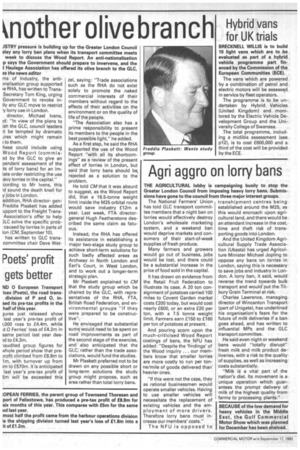Agri aggro on lorry bans
Page 6

If you've noticed an error in this article please click here to report it so we can fix it.
THE AGRICULTURAL lobby is campaigning busily to stop the Greater London Council from imposing heavy lorry bans. Submissions have gone to the council from three major interest groups.
The National Farmers' Union has told GLC transport committee members that a night ban on lorries would effectively destroy London's wholesale marketing system, and a weekend ban would deprive markets and consumers of their start-of-week supplies of fresh produce.
Many farmers and growers would go out of business, jobs would be lost, and there could be a substantial increase in the price of food sold in the capital.
It has drawn on evidence from the Retail Fruit Federation to illustrate its case. A 20 ton consignment of potatoes carried 100 miles to Covent Garden market costs £200 today, but would cost nearly £600, or an extra £20 per ton, with a 7,5 tonne weight limit. Farmers earn £150 to £160 per ton of potatoes at present.
And pouring scorn upon the much-criticised Wood Report costings of bans, the NFU has added: "Despite the 'findings' of the Wood inquiry ... our members know that smaller lorries are more costly to run per tonrte/mile of goods delivered than heavier ones.
"If this were not the case, they as rational businessmen would operate smaller vehicles. Having to use smaller vehicles will necessitate the replacement of existing vehicles and the employment of more drivers. Therefore lorry bans must increase our members' costs."
The NFU is opposed to transhipment centres being established around the M25, as this would encroach upon agricultural land, and there would be an attendant increase in the cost, time and theft risk of transporting goods into London.
And the United Kingdom Agricultural Supply Trade Association (Ukasta) has urged Agriculture Minister Michael Jopling to oppose any bans on lorries in London, saying this is necessary to save jobs and industry in London. A lorry ban, it said, would reverse the trend towards bulk transport and would put the Tilbury Grain Terminal at risk.
Charles Lawrence, managing director of Wincanton Transport (part of Unigate), has underlined his organisation's fears for the future of milk deliveries if a ban goes ahead, and has written to influential MPs and the GLC transport committee.
He said even night or weekend bans would "totally disrupt" fresh milk and milk product deliveries, with a risk to the quality of supplies, as well as increasing costs substantially.
"Milk IS a vital part of the nation's diet. Its movement is a unique operation which guarantees the prompt delivery of milk of the highest quality from farms to processing plants."
































































































